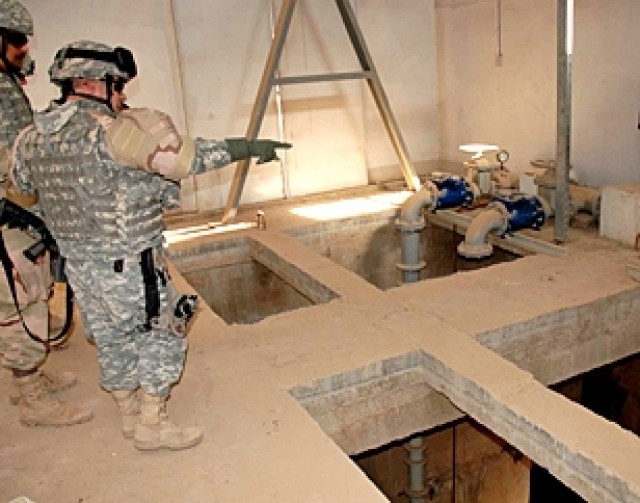Baghdad, Dec. 14, 2006 - Baghdad is facing some challenging times and for the situation to get better, most officials believe local residents need to see that their government is working and improvements are taking place.
Maj. Robert Nash, Officer in Charge of the U.S. Army Corps of Engineers (USACE) International Zone office, points out his staff is overseeing about 150 projects worth $500 million to upgrade essential services in Baghdad.
"We're rebuilding gas stations, paving roads, repairing sewer lift stations, installing new potable water networks, and paving roads," Nash said. "We're also renovating hospitals, building healthcare centers, installing neighborhood electric distribution networks, and rehabilitating water treatment plants."
The new initiative is called Operation Together Forward with an emphasis on clearing out insurgent elements in certain key areas and then funding a variety of community projects so residents can see that things are getting better.
"We're just getting started on those new projects," Nash continued. "When fully underway, there will be thousands of Iraqis employed and their work will have a lasting, positive impact. As an example, 18 gas stations are being renovated throughout Baghdad and a variety of water and sewer issues are being e resolved."
Nash's office works with U.S. military units attached to the 1st Calvary Division including the 9th Engineer Battalion commanded by Lt. Col. Glen Masset, who keeps track of all ongoing community improvements in the northwest quadrant of Baghdad.
Baghdad City Government (Amanat), United States Agency for International Development, the Baghdad Provincial Reconstruction Team, USACE, and Masset's Brigade are all sponsoring projects to help the Iraqi people.
"Our top priority is helping the Iraqi government get on its feet as local and city officials work to improve various essential services for their residents," Masset explained.
Masset said townspeople gave them a definite positive response when they started a trash clean-up program in west Baghdad. "We're also putting in street lighting, getting an abandoned slaughterhouse for cattle and sheep renovated, cleaning out a major drainage canal, and providing portable generators to area schools, including 500-liter fuel tanks and 500 liters of fuel."
Operation Together Forward involves neighborhoods throughout the metropolitan area.
One such example is Doura in south Baghdad, a community of 265,000 residents, where Nash's engineers are overseeing the following projects:
Construction of two new million-dollar schools.
Four road projects: (1) paving 35,000 sq. meters of roadway and overlaying 60,000 square meters in Mahalla 856; (2) overlaying 35,000 square meters of roadway in Mahalla 848; (3) paving and overlaying roads in Mahallas 822, 824, 826; (4) paving about 3.7 kilometers of road in Mahallas 850 and 852.
Four sewage system improvements: (1) rebuilding the sewage pump station in Mahalla 848; (2) replacing generators, electrical panel boards, and pumps, for sewage lift stations in Mahalla 856; (3) constructing a combined sewer in Mahalla 840; (4) repairing a collapsed sewer network in Mahalla 824 which includes 280 meters of 900mm (36 in.) sewer pipe, new concrete manholes, and replacement of the storm drains.
Construction of a potable water network in Mahalla 824.
Apart from work helping individual areas, big-ticket projects are also part of the effort including more than $100 million for a new electrical distribution network and more than $20 million for new water lines in Sadr City (an area with 2.5 million residents), as well as $300 million for three major sewer trunk lines helping the entire metropolitan area.
Abdul-Kareem, one of the Iraqis working in Nash's office, says his neighborhood is noticing a difference. "They're repairing six non-functioning sewer lift stations that haven't had maintenance in 15 years, as well as cleaning out blocked collection lines.
"That work is getting sewage off the street preventing disease that's threatening our children. These are important indicators we're moving in the right direction."


Social Sharing